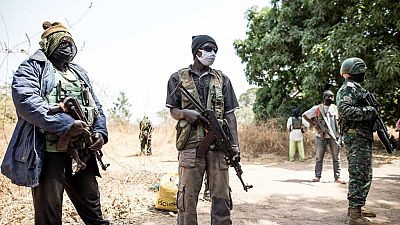Guinea-Bissau
Senegal has signed a peace agreement with Casamance rebels who have pledged to lay down their arms and work for the definitive return of peace in this region.
Rebel leader César Atoute Badiate, head of a unit of the Movement of Democratic Forces of Casamance (MFDC), and an emissary of Senegalese President Macky Sall signed the agreement at the presidency of the Guinea-Bissau Republic.
Macky Sall has made "definitive peace" in Casamance one of the priorities of his second term. His negotiations for a settlement of the conflict have not led to a final agreement, complicated by divisions within the MFDC.
"You went into the bush when I was 10 years old. Today I am 50. I think that's enough now. (...) How many people have died, been maimed or left their villages? We will accompany you in the search for peace," said Guinea-Bissau head of state Umaro Sissoco Embalo, addressing César Atoute Badiate.
"I can assure you that we are going to be the guarantors of this agreement," continued the current president of the Economic Community of West African States (ECOWAS). The document signed remains confidential for the time being.
"I welcome the peace agreement and the laying down of arms signed on 4 August in Bissau between Senegal and the provisional committee of the political and fighting wings of the MFDC. I remain committed to the consolidation of lasting peace in Casamance," President Macky Sall tweeted on Thursday evening, also thanking Umaro Sissoco Embalo for his mediation.
The MFDC has been waging a low-intensity conflict since 1982, causing several thousand deaths. This conflict remained latent until the launch in January 2021 by the Senegalese army of a major offensive against the rebels.
The Casamance rebels, accused of trafficking in timber and cannabis, have often taken refuge in Gambia or Guinea-Bissau, which also shares a border with Senegal.
Casamance was a Portuguese possession for several centuries before being ceded to the French colonial empire in 1888 and then integrated into Senegal at the time of its independence in 1960.














01:09
NGOs sue Spain for ignoring illegal fishing threat to African coasts
01:40
‘The Herds’ puppets highlight climate change in Lagos
01:53
Returning home to nothing: Displaced families in eastern DRC face dire humanitarian crisis
00:58
Senegal: MP Proposes High Treason Charges Against Former President Macky Sall
Go to video
United Nations says peacekeeping is having to adapt faster
Go to video
Senegal goes after Macky Sall era officials with amnesty law change